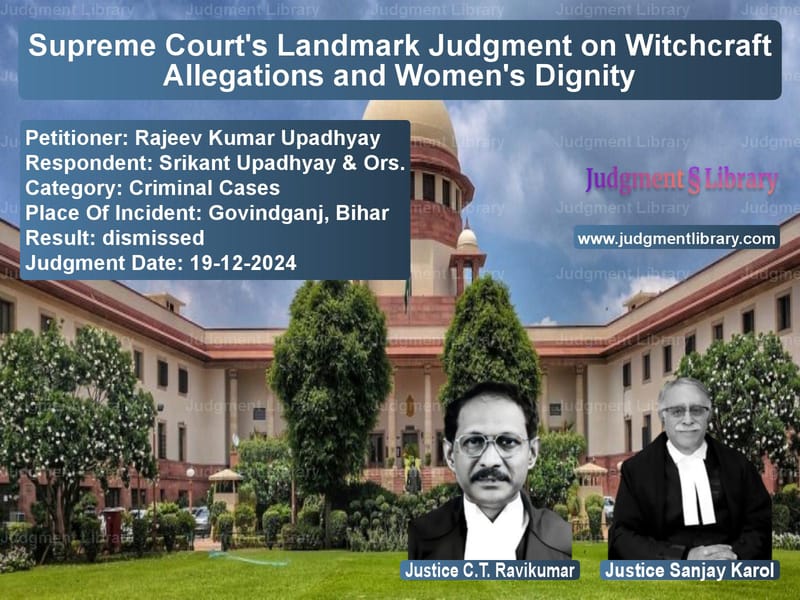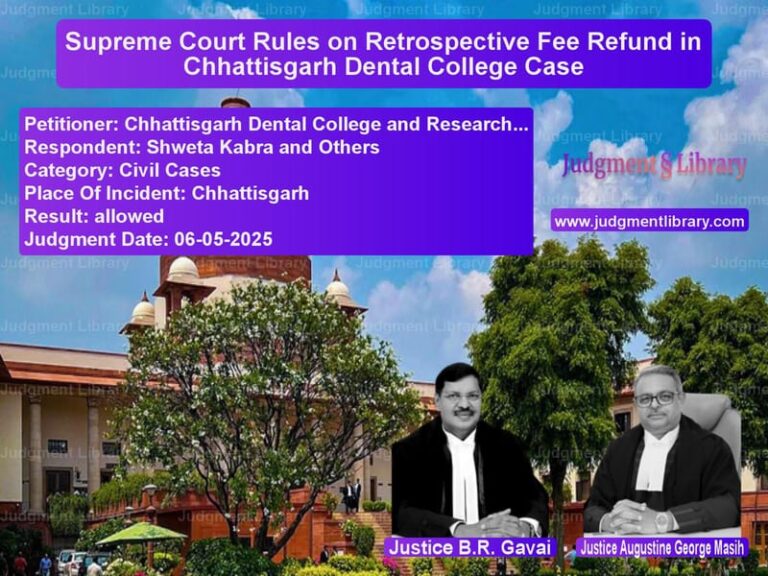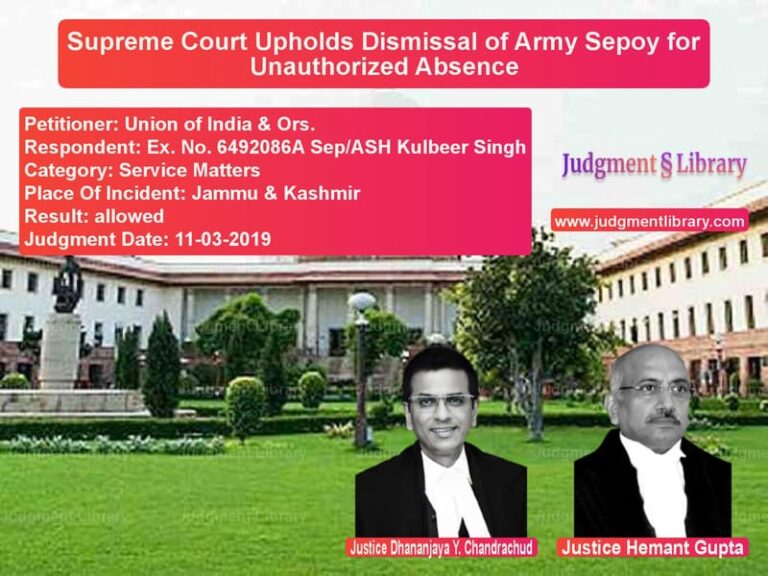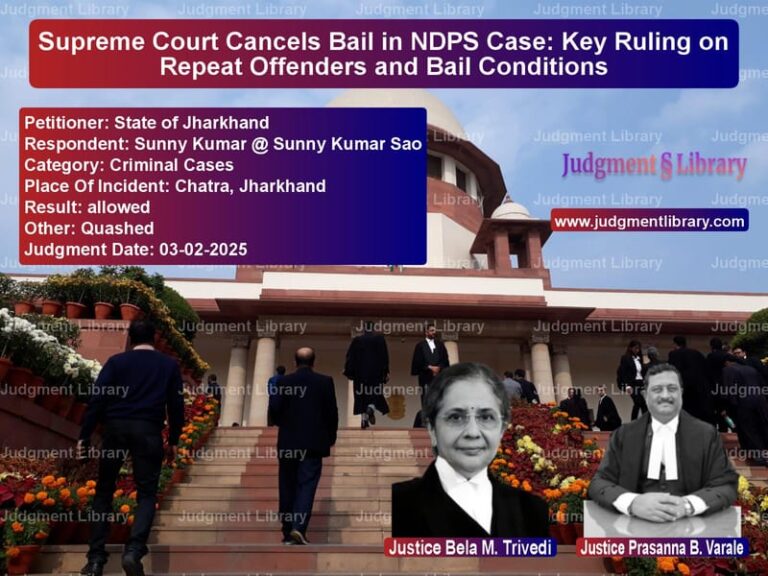Supreme Court’s Landmark Judgment on Witchcraft Allegations and Women’s Dignity
The Supreme Court of India, in the case of Rajeev Kumar Upadhyay vs. Srikant Upadhyay & Ors., addressed a critical issue concerning gender-based violence and the unconstitutional practice of witch-hunting. The ruling, authored by Justice Sanjay Karol and Justice C.T. Ravikumar, serves as a crucial intervention in reinforcing the constitutional guarantee of dignity and protection of women’s rights.
The case centers around an elderly woman in Govindganj, Bihar, who was falsely accused of practicing witchcraft, subjected to inhuman treatment, and attacked by multiple individuals. The Supreme Court’s judgment sheds light on the failure of law enforcement, the judicial obligations in cases involving crimes against women, and the need for urgent legislative intervention to curb such archaic and brutal practices.
Background of the Case
The case stems from an FIR (No. 79/2020) registered on March 4, 2020, under various sections of the Indian Penal Code, 1860, and the Witch (Daain) Act, against 13 accused individuals, including members of the Upadhyay family. The complaint alleged:
- The victim was falsely accused of making a man sick using witchcraft.
- She was forcibly fed human waste.
- Her clothes were torn, leaving her partially naked.
- Attempts were made to parade her naked through the village.
- Family members who intervened were assaulted.
Despite the gravity of the allegations, the police initially refused to register the complaint, leading the victim’s family to seek judicial intervention under Section 156(3) of the Code of Criminal Procedure (CrPC). However, the subsequent police investigation led to a chargesheet against only one of the accused, ignoring the direct allegations against others.
Petitioner’s Arguments
The petitioner, Rajeev Kumar Upadhyay, challenged the High Court’s stay on proceedings, arguing that:
- The chargesheet arbitrarily named only one accused, allowing others to escape trial.
- The High Court granted a stay on proceedings without due consideration of the case’s seriousness.
- The crimes involved grave violations of dignity and gender-based violence, necessitating urgent judicial intervention.
Respondents’ Arguments
The accused individuals countered that:
- The allegations were exaggerated and driven by a family dispute.
- The police investigation did not find sufficient evidence against most of the accused.
- The High Court’s stay order was justified in light of procedural shortcomings in the investigation.
Judicial Findings
Violation of Article 21
The Court ruled that the right to life with dignity under Article 21 of the Constitution was severely compromised. Citing landmark judgments, including K.S. Puttaswamy v. Union of India and Francis Coralie Mullin v. State, the Court emphasized:
“Dignity is an integral aspect of life, and any act that undermines an individual’s dignity is an affront to the Constitution.”
Criticism of Law Enforcement and the High Court
The Court expressed concern over the police’s reluctance to file the FIR and the High Court’s decision to stay proceedings, stating:
“A stay cannot be granted mechanically, especially in cases involving crimes against women. The judicial system must show greater sensitivity in handling such cases.”
International Obligations
The judgment referenced India’s commitment under international treaties like the CEDAW (Convention on the Elimination of All Forms of Discrimination Against Women) and the Universal Declaration of Human Rights, reaffirming:
“The State has an obligation to protect women against discrimination, ensure justice, and create a society free from gender-based violence.”
Impact of the Judgment
The Court directed that:
- The trial must proceed on a day-to-day basis.
- The accused must appear before the Trial Court on January 15, 2025.
- Authorities must ensure protection for the victim and her family.
This landmark judgment underscores the ongoing challenges women face, particularly in rural India, and reinforces the constitutional commitment to dignity and justice.
Petitioner Name: Rajeev Kumar Upadhyay.Respondent Name: Srikant Upadhyay & Ors..Judgment By: Justice C.T. Ravikumar, Justice Sanjay Karol.Place Of Incident: Govindganj, Bihar.Judgment Date: 19-12-2024.
Don’t miss out on the full details! Download the complete judgment in PDF format below and gain valuable insights instantly!
Download Judgment: rajeev-kumar-upadhya-vs-srikant-upadhyay-&-o-supreme-court-of-india-judgment-dated-19-12-2024.pdf
Directly Download Judgment: Directly download this Judgment
See all petitions in Custodial Deaths and Police Misconduct
See all petitions in SC/ST Act Case
See all petitions in Suicide Cases
See all petitions in Extortion and Blackmail
See all petitions in Judgment by C.T. Ravikumar
See all petitions in Judgment by Sanjay Karol
See all petitions in dismissed
See all petitions in supreme court of India judgments December 2024
See all petitions in 2024 judgments
See all posts in Criminal Cases Category
See all allowed petitions in Criminal Cases Category
See all Dismissed petitions in Criminal Cases Category
See all partially allowed petitions in Criminal Cases Category







